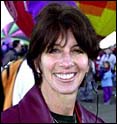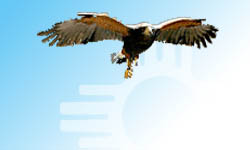Duncan Blitz could only sleep an hour or two since he was embedded in Iraq. "How was it?" asked everyone. "It was scary, but good," he told them. "Were you shot at?" "Only once, by our own troops." "Friendly Fire," they said, knowingly. Yes, friendlies. "What kind of government will we put in over there?" they asked. Duncan didn't know. He asked Beverly Barkowitz, his assignment editor at KABQ-TV to put him on features and sports. She sent him to the Albuquerque Isotopes for "Lou Gehrig Bobblehead Night" at the ballpark. Duncan got on his knees to shoot two very cute kids, one with a bobblehead, the other licking an ice cream, and then made a wider shot that included parents and a grandpa. They seem so happy, he thought. They're intact, not blown out of their homes or escaping in a truckbed. Stop it, he told himself. It's okay for them to enjoy the game. They didn't kill any Iraqis. Bev sent Duncan with Kip Pishpek, the weekend anchor, to shoot intros for his "New Mexico Encore" segment in northern New Mexico. They stopped at the café in Truchas. A small child and a man wearing a blue bandana on his head and a tatoo of Our Lady Of Guadalupe on his forearm, sat at a table beneath a section of ceiling decorated with dollar bills. Pishpek tried to tuck a droopy dollar back in place. Duncan asked the woman behind the counter for two coffees. "The power's not on," she said, without apology, "try later, for dinner." The man at the table had something wrong with one of his eyes. He said something in Spanish to the kid, who smiled, paying no attention to the two tall Anglos leaving the café in their Explorer. "Three, two, one," said Pishpek in front
of the Rio Arriba County Courthouse in Tierra Amarilla, while Duncan
shot: Duncan shoved the bodies from his mind and looked carefully at the LEDs in his viewfinder as he stopped listening: After their violent attempt to win back the "land grant", or land guaranteed under the Treaty of Guadalupe Hidalgo in 1848," Tijerina escaped, and a nationwide manhunt began. Duncan shot scenics in Villanueva and Kip interviewed
a land grant heir named Chris Romero: The guys headed home till traffic backed up in Espanola. Duncan spotted a café with pick-up trucks in the parking lot. Everyone inside wore baseball caps. "Manny's Towing" said one, "Ohkay Casino," another. Duncan's said "Storm Watch Seven," Kip wore "Flying Star." They ate carne asada with beans and rice, then headed toward Albuquerque on the "WIPP" bypass, an express route built for trucks hauling nuclear waste from Los Alamos Lab to an underground site in southern New Mexico. Kip said they should bury the nuclear waste inside dirty Pampers but Duncan didn't laugh. He was thinking about an Iraqi smattered like a pumpkin on the highway. "You okay?" asked Kip. "Yeah." They listened to the Spurs game the rest of their drive. Duncan parked at the news entrance and handed the tapes to Kip. Mona, the graphics operator with tomboy hair and girl-girl face was having a smoke at the news entrance. "So, Duncster, do you think Saddam Hussein is alive?" she asked. "Yeah, possibly," he said. Blitz looked at the iris recognition camera, unlocking the newsroom entry without waiting for Mona to ask him the whereabouts of Osama Bin Laden. Hell, he didn't even know where his own son was. The divorce lawyer had faxed him before he left for Iraq, demanding a check for orthodontia. He missed his boy. He liked contributing to his care. He wanted to see him in braces. I bet he chose green, he thought, if that's still his favorite color. Duncan Blitz watched Kip do a cut-in from the newsroom "perch" and glanced at the assignment board. Seeing nothing posted about his near-future, he nuked a cup of Tension Tamer tea in the crew lounge and brought it out to his crew car. Watching an editor relax in the sun, Duncan Blitz felt vaguely agitated. Maybe he'd be happier editing. He shut his eyes and drifted. A perfectly symmetrical symbol, intricate in design and execution, had stained his quilt. It must be from a wounded soldier, Duncan decided. HONK. Wake up. "Satellite Sal," in the uplink truck, needed to get by. I want to go home, thought Dunc, and radio'ed Bev for his goodnight. He drove home through the canyon under a sky spangled cumulous, dark underneath. He fed Wiley and sat on his little porch as the sky gave itself up in orange streaks and swirls and pink. Maybe he should pierce his ear, maybe it was too late for that. A tatoo maybe. He survived the war and came home, he should pierce something. Duncan did chores, feeding and raking. He loved the physical effort, it centered and soothed his soul. He split wood, then split again, into kindling. The kindling went in a plastic tub on the porch. It wouldn't be cold enough to light the woodstove till morning. Chores done, Duncan realized he'd been thinking. He went inside, opened a beer, and checked whether the thoughts grouped into anything important. Duncan Blitz took another Tecate to his keyboard and played "Linus and Lucy." He worked his way through Bach's piano concerto number 1 in D major, and then he played "Let it Be." He sang "Imagine." Imagine all the people living life in peace. He read in bed, dead quiet on the mountain.
"The hawk loves and protects me," Duncan told his mother the next day, recounting his dream. "What do you think it means?" "You eat dinner too late," said his mom. © AMY BOWERS |
|
|
Write a Letter
to the Editor |

